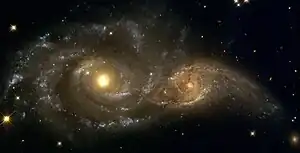| NGC 2207 / IC 2163 | |
|---|---|
 Hubble Space Telescope image of NGC 2207 (left) and IC 2163 (right) | |
| Observation data (J2000 epoch) | |
| Constellation | Canis Major |
| Right ascension | 06h 16m 22.0s / 06h 16m 28.0s[1] |
| Declination | −21° 22′ 22″ / −21° 22′ 33″[1] |
| Redshift | 2741 ± 15 / 2765 ± 20 km/s[1] |
| Distance | 81 ± 39 Mly (24.9 ± 12 Mpc)[2] |
| Apparent magnitude (V) | 12.2 / 11.6[1] |
| Characteristics | |
| Type | SAB(rs)bc pec / SB(rs)c pec[1] |
| Apparent size (V) | 4.3′ × 2.8′ / 3.0′ × 1.2′[1] |
| Notable features | colliding galaxies |
| Other designations | |
| RR132a / RR132b,[1] PGC 018749 / 018751, UGCA 124/125[1] | |
NGC 2207 and IC 2163 are a pair of colliding spiral galaxies about 80 million light-years away[2] in the constellation Canis Major. Both galaxies were discovered by John Herschel in 1835.
The larger spiral, NGC 2207, is classified as an intermediate spiral galaxy exhibiting a weak inner ring structure around the central bar. The smaller companion spiral, IC 2163, is classified as a barred spiral galaxy that also exhibits a weak inner ring and an elongated spiral arm that is likely being stretched by tidal forces with the larger companion. Both galaxies contain a vast amount of dust and gas, and are beginning to exhibit enhanced rates of star formation, as seen in infrared images.
NGC 2207 is in the process of colliding and merging with IC 2163. But unlike the Antennae or the Mice Galaxies, they are still two separate spiral galaxies. They are only in the first step of colliding and merging, with NGC 2207 being in the process of tidally stripping IC 2163. Soon they will collide, probably looking a bit more like the Mice Galaxies. In about a billion years time they are expected to merge and become an elliptical galaxy or perhaps a disk galaxy.[3]
Four supernovae have been observed in NGC 2207:
- type Ia SN 1975a in January 1975[4]
- type Ib SN 1999ec in October 1999[5]
- type Ib SN 2003H—discovered halfway between the two galaxies[6]
- type II supernova SN 2013ai in March 2013[7]
Two supernovae have been observed in IC 2163:[8]
- type II SN 2018lab
- unknown type SN SPIRITS17lb
See also
References
- 1 2 3 4 5 6 7 8 "NASA/IPAC Extragalactic Database". Results for NGC 2207 / IC 2163. Retrieved 2006-11-25.
- 1 2 "Distance Results for NGC 2207". NASA/IPAC Extragalactic Database. Retrieved 2010-05-22.
- ↑ Junko Ueda; et al. (2014). "Cold molecular gas in merger remnants. I. Formation of molecular gas disks". The Astrophysical Journal Supplement Series. 214 (1): 1. arXiv:1407.6873. Bibcode:2014ApJS..214....1U. doi:10.1088/0067-0049/214/1/1. S2CID 716993.
- ↑ Kirshner, Robert P.; Arp, H.C.; Dunlap, J.R. (1976). "Observations of Supernovae - 1975a in NGC 2207 and 1975b in the Perseus Cluster". Astrophysical Journal. 207 (1): 44–52. Bibcode:1976ApJ...207...44K. doi:10.1086/154465.
- ↑ Jha, S.; Garnavich, P.; Challis, P.; Kirshner, R.; et al. (1999). "Supernova 1999ec in NGC 2207". IAU Circular. 7269: 2. Bibcode:1999IAUC.7269....2J.
- ↑ van den Bergh, Sidney; Li, Weidong; Filippenko, Alexei V. (2003). "Classifications of the Host Galaxies of Supernovae, Set II". The Publications of the Astronomical Society of the Pacific. 115 (813): 1280–88. arXiv:astro-ph/0308195. Bibcode:2003PASP..115.1280V. doi:10.1086/379106. S2CID 2015979.
- ↑ Conseil, E.; Fraser, M.; Inserra, C.; Walton, N.; et al. (2013). "Supernova 2013ai in NGC 2207 = Psn J06161835-2122329". Central Bureau Electronic Telegrams. 3431 (3431): 1. Bibcode:2013CBET.3431....1K.
- ↑ 2018lab in IC 2136 (David Bishop)